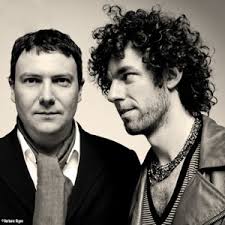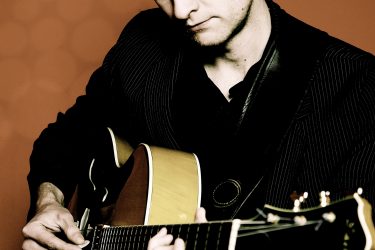TWO ALBUM LAUNCHES – ONE GLORIOUS NIGHT. New albums of the band of trumpeter Fulvio Sigurta (trumpet) on Camjazz and the duo of Bruno Heinen and Kristian Borring on Babel celebrating Bill Evans.
| Postcard To Bill EvansBruno Heinen – Piano, Kristian Borring – Guitar
This project reeks of the grimy adrenaline of the clubs of the 1950’s and 1960’s New York -Jazzwise Magazine Critically acclaimed London based pianist Bruno Heinen and guitarist Kristian Borring have joined forces for their new duo project ‘Postcard to Bill’; original arrangements of compositions by the great pianist Bill Evans. Following on from two sell-out dates at the Vortex, the duo have recorded for the legendary British label Babel, which will be coming out in May 2015. John Fordham of the Guardian says of the two musicians; Erudition, eclectic studies and a jazz sensibility make Heinen the kind of newcomer who repositions the goalposts…(and Kristian Borring has)…a hyper-cool and low-key approach to jazz guitar, but with warmth, confidence and a rhythmic hipness that’s thoroughly contemporary. This empathic partnership was formed out of Heinen’s project to explore the music of Bill Evans in a quintet fomat. However, inspired by the recordings of Bill Evans and the late guitarist Jim Hall and intrigued by working as a duo they continued to play the challenging repertoire of Evans as two. Bruno Heinen has been quoted as having a “beguiling touch”, and his last release ‘Tierkreis – Signs of the Zodiac’ was ranked in the top 10 albums for 2014 by Uncut Magazine, Musique Machine (USA) and Textura (Canada), and described by the same magazine as “the shiniest jewel in Babel’s crown”. Danish born Kristian Borring has been cited as a “melodic, precise player with a round and open tone” (All About Jazz). In 2014 he received acclaim for his latest release “Urban Novel” where his playing as well as his music was described in The Scotsman as “Clean, Cool, Precise and Contemporary”.
The Oldest Living Thing
Fulvio Sigurta’, trumpet Federico Casagrande, acoustic guitar (Liner notes from Brian Morton for the album which includes Steve Swallow on bass) When Ken Wheeler died, it seemed like the extinction of a sound, as if some very old living thing, quite distinct from the man who made it, had gone into the dark forever. But then pretty soon along came a new recording from Fulvio Sigurtà and it was a little like hearing again in the forest the call of a bird that had once sung everywhere. How to describe that sound? Admirers of Sigurtà’s previous work on Cam Jazz, from the debut House Of Cards through the lyrical minimalism of Through The Journey to the rock-influenced trio dynamics of SPL will already have shaped an expectation, not just of the voice but also of a music that is capable of confronting moral and environmental danger, as on the quietly angry (isn’t it?) House Of Cards, but equally capable of proposing a world elsewhere, a utopian space in which there is only sound and only the moment. Conservatory trained, but also deeply versed in jazz, Sigurtà avoids the strident taratantara of classical trumpeting or the more boisterous aspects of bop brass. The usual destination for players of that temperament is one or another version of Miles Davis’s painterly approach, laying soft, often thinned out layers of colour over the musical canvas. Sigurtà knows the virtues of quiet and space, and seems incapable of playing an irrelevant note just to prove that he’s still on the stand. But his sound is not Milesian in the usual sense. It has more breath and in a curious way more brass in it. Listening to the opening of “Sunday Snow Flakes”, which comes on like a great pop song over that great swelling guitar line from Federico Casagrande, who wrote the piece, and the trumpet passes through more timbres in a minute than most players manage in a night, challenging the writer to find a word: reedy, then cello-like, then something like a shawm, finally like a human voice. It’s a staggering performance. It wouldn’t be so without the group dynamic, of course. The previous track “Marmotte” has already shown how comfortably Sigurtà’s fellow travellers occupy the front line for a spell. No surprise in Steve Swallow’s case. The man virtually invented that singing, melodic style on bass guitar, a million miles removed from the thunk and slap of most electric bass playing. Though he’s quite capable of something in that style, as he shows in the intro to “Travel Back” And Casagrande, who can pick the ideal harmonic out of the air to punctuate or close a piece (the latter on “Travel Back”, the scratchiest, most restless item here), is always absolutely at the centre of things, even when he appears to be doing something very simple or very little at all. Even his breaths and finger slides are musical. Where does it all come from? There are primal connections here to the great works of modern jazz, to the modern classical canon, to folk forms. The music doesn’t immediately sound of American provenance, but Swallow can change that by turning up his volume and putting more weight in his attack. Neither is it self-evidently European, let alone Italian. There are connections to British music, in which the trumpeter served an intriguing apprenticeship at Guildhall and in some impressively attested big bands. Anyone with a screen memory of Mark Charig’s cornet part on King Crimson’s “Islands” will be perfectly at home with Sigurta’s playing on that great Morricone tune, even if the actual sound and context are quite, quite different. A musician to treasure, then, not because he is reliably the same, but because he is so reliably different, album to album, track to track, measure to measure. And unlike the majority of “impressive” young players whose salty innovation immediately leaves one thirsty for the next song or album, Sigurtà offers a home and sojourn in every musical moment. I spent an hour pressing repeat on “Oldest Living Thing”, mostly just for the sound of it, but also wondering what the title meant. He may have a different answer but I sense it refers to music itself. Our planetary survivor.
|



